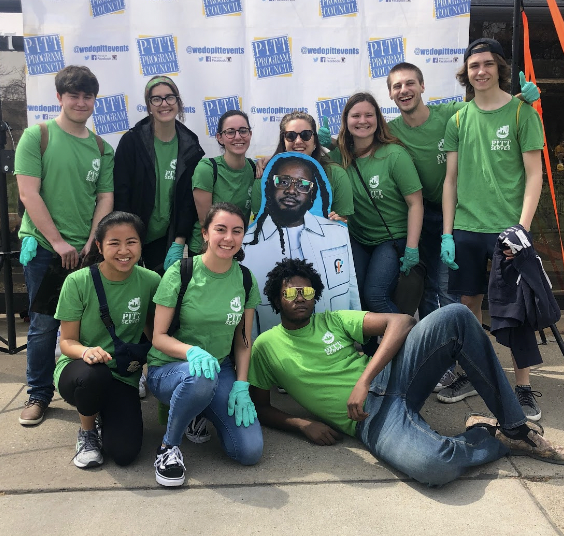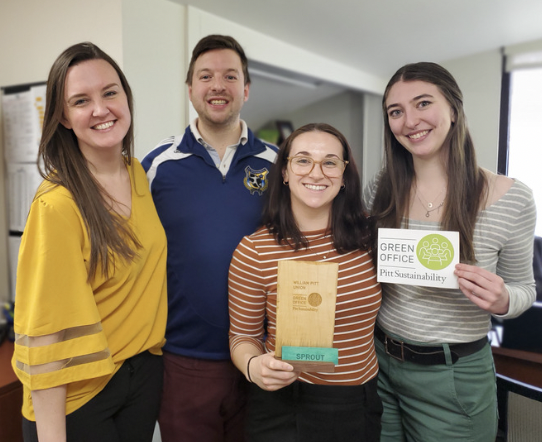Engagement & Awareness Progress, 2018-22

We work to weave a culture of sustainability into the everyday fabric of our campus and community.
2018 Pitt Sustainability Plan Goals
- SURVEY: Create and deploy a comprehensive campus survey on student, staff, and faculty sustainability literacy by 2020.
- STUDENTS: Incorporate the tenets of sustainability into all student programming.
- TRAINING: Train all staff (incoming and retained) on how to infuse the tenets of sustainability into their everyday work at Pitt.
- EMPLOYEES: Create an online sustainability education module for staff.
- TEAMWORK: Develop departmental Green Teams.
- CELEBRATE: Share our stories of impact as leaders on a national scale and promote our model of sustainability.
Where We Are: Sustainability Literacy & Culture
In Spring 2020, Pitt’s Office of Sustainability administered the second Pitt Sustainability Culture Survey, embedded in the first of a new triennial “Pitt Sustainability Literacy & Culture Survey.” Simultaneously assessing Pitt community members’ sustainability knowledge, practices, opinions, and preferences, the 2020 survey had 1,033 respondents across all five University of Pittsburgh campuses.
Sustainability Literacy: In the 2020 survey, 92% of respondents answered 50% or more of the 20 sustainability literacy questions correctly, but only 43% of survey takers answered 75% or more of the questions correctly. Knowledge gaps existed about climate change, poverty, and the Sustainable Development Goals; these results helped the Pitt Sustainability team focus educational efforts from 2020 forward.
Sustainability Culture: In the 2020 survey, 51% of respondents agreed that Pitt was a leader in sustainability practices relative to other universities; this response was a notable increase from 2017, when only 30% of people choose to “agree” to “strongly agree” that Pitt was a leader in sustainability practices compared to other universities. Other 2020 sustainability culture survey responses informed development of campus-wide sustainability efforts, including the creation of the Sustainability Professional Certificate program for employees and the 2022 Pitt Climate Action Plan.
Reflecting its triennial schedule, the next Pitt Sustainability Literacy & Culture Survey will be delivered in Spring 2023.
Where We Are: Campus Culture
Pitt Green Guides: Though the first official Pitt Student Green Guide was published in 2017, Pitt’s Student and Employee Green Guides were embedded into the Pitt Sustainability website in 2020. These interactive and dynamic resources combines information from across the University, allowing Pitt community members to easily and actively engage in Pitt’s thriving culture of sustainability.

Pitt Green Events: The University of Pittsburgh’s Pitt Green Event program was started in 2016 by the Student Office of Sustainability, supporting events that utilized zero waste and other sustainable event strategies. From Fall 2018 through Spring 2020, the Pitt Green Event program tracked 193 self-identifying Pitt Green Events, attended by 45,134 attendees. Due to the global Covid-19 pandemic, no Pitt Green Events were tracked from Summer 2020 through Summer 2021.
Pitt Green Host: In Fall 2022, the Pitt Green Event designation evolved into a new Pitt Green Host format to allow green events to proliferate more broadly and quickly across the University. The Pitt Green Host program trains employees and students on how to host a green event from conception to execution by providing education about and access to information on sustainable purchasing practices, zero waste principles, and accessibility. Successful candidates gain access to the Pitt Green Host community and sustainable event planning resources. In Fall 2022, the Pitt Green Host designation was piloted with over 75 employees and students becoming Pitt Green Hosts.

Pitt Green Ambassadors: Being piloted in 2022-23, Pitt Green Ambassadors is a peer-education program that embeds sustainability throughout the University regardless of department, campus, or areas of expertise. Individuals who have successfully demonstrated their knowledge of Pitt’s Sustainability commitments, strategies, and programs sign up to help educate and train their peers on sustainability at Pitt and off-campus.
Where We Are: Student Engagement

Student Office of Sustainability: Founded in 2014 by Student Government Board, Pitt’s Student Office of Sustainability (SOOS) is a unique student-led unit in Student Affairs. With 20+ affiliated student organizations, SOOS leads coordination of student sustainability activitesactivities on-campus and supports the potential of students to creatively revolutionize the way the Pitt community approaches environmental and social justice. . Since 2015, the SOOS team has grown to include 7 student leaders and a staff lead working to engage students in sustainability programs and help raise awareness about Pitt’s sustainability progress.
Pitt Green Fund: The student-run Pitt Green Fund finances and supports student-initiated projects and programs that make Pitt’s operations more environmentally sustainable, socially equitable, and energy efficient. Piloted by Pitt’s Student Government Board in 2010, the Pitt Green Fund was formally created in 2011 with student activity fee-based funding as the “Green Fund Advisory Board.” From 2018 through Fall 2022, Pitt Green Fund invested $34,249 in 56 projects including, but not limited to, menstrual equity; solar picnic tables; composting programs; and internships focused on diversity, equity, and inclusion.
Pitt EcoReps: In 2019, the University of Pittsburgh established the Pitt EcoReps program to promote a culture of sustainability within residence halls. Pitt EcoRep students work with members of the Pitt community to integrate sustainability into the residence hall culture by reducing energy and water use, increasing recycling and composting, and advancing other sustainability initiatives. Pitt EcoReps lead the deployment of Pitt Green Resident & Floor designations.
Pitt Green Residents & Floors: Launched in 2018, the Pitt Green Resident designation engages students living in residence halls to examine their everyday practices via a self-assessment and encourages them to adopt sustainable behaviors. From 2019 through 2022, the Pitt Green Resident program had 3,444 participants, of which 1,590 students gained the Pitt Green Resident designation (including 254 students in Fall 2022). From 2019 through 2022, 5 residence hall floors earned Pitt Green Floor distinctions when 50% of their residents earned Pitt Green Residents designations.
Where We Are: Employee Engagement

Since 2018, several Pitt divisions have created official “green teams,” including Athletics, Hospitality, Student Affairs, and the University Stores. Most offices, departments, and divisions engage with sustainability through University-wide “Pitt Green” programs (all launched since 2017).
Pitt Green Offices: First piloted in 2018, the Pitt Green Office designation became a University-wide offering in 2019. Through 2022, there were 54 Pitt Green Offices across 4 achievement levels (Seed, Sprout, Sapling, and Sustainable Oak). The Pitt Green Office assessment helps offices evaluate their practices relating to energy, food, transportation, printing, purchasing, waste, and their culture of sustainability. Pitt’s Office of Sustainability provides follow-on guidance to help offices grow to the next level of achievement.
Pitt Green Laboratories: Piloted in 2019, the Pitt Green Lab designation provides Pitt laboratories an opportunity to assess their current operational practices and earn recognition across 4 achievement levels. Similar to the Pitt Green Office program, To date, 22 labs have achieved a Pitt Green Laboratory designation across a variety of disciplines; their actions are are building a thriving culture of sustainability and help inform the University’s Sustainable Laboratories Committee.

Where We Are: Online Employee Learning
Pitt Sustainability Employee Orientation Video: In April 2019, a Business and Operations Emerging Leader project developed the first Pitt Sustainability employee orientation video. It has been shown from April 2019 through the present, reaching approximately 6,830 new hires through February 2022.

Pitt Green Home Office Challenge:
Launched in 2020, the Pitt Green Home Office Challenge helps employees support Pitt’s culture of sustainability while working remotely. From 2020-2022 203 employees have accepted the Challenge, collectively avoiding over 1.3 million pounds of CO2e through sustainable practices in their home offices. While not an official online learning module, the Green Home Office Challenge helps Pitt employees think holistically about their home workspaces and incorporate small changes to be more sustainable when working from home.
Virtual Events: During the Covid-19 pandemic, the Pitt Sustainability team hosted Green Home Office Lunch & Learns to engage the Pitt community on sustainability topics; recordings from these sessions are available on the Pitt Sustainability YouTube page, which also includes curated video playlists on a multitude of sustainability topics to help individuals learn about energy, climate change, ecology, economy, environmental justice, and more. Several sustainability-focused events still offer all or partial virtual attendance options, making them more accessible across the University and to external partners.
How You Can Help: With the launch of the Pitt Climate Action Plan in 2022, answers the number one question we get from Pitt employees: “ Pitt and the world advance toward carbon neutrality?” While the University itself is making big sustainability decisions, individual actions also make an imperative difference at Pitt, at home, and around the world. Resources include, but are not limited to, active and shared commuting options, home energy efficiency, and retirement investments considering sustainability-related criteria.
Where We Are: Online Professional Development
Employee Sustainability Professional Certificate: A professional development opportunity for Pitt employees through the Office of Human Resources’ Faculty and Staff Development Program, the Sustainability Professional Certificate helps participants gain knowledge to apply core sustainability principles and create solutions throughout their career that balance equity, environment, and economy. To earn the certificate, employees take 6 professional development classes offered by the Pitt Sustainability team. The first “Sustainability Foundations” class was taught in 2021 and the first certificates earned in 2022. From October 2021 to December 2022, 187 employees attended at least one class and 19 individuals completed the certificate from 17 different University departments.
Where We Are: National Collaborations

AASHE: Since 2017 the University of Pittsburgh has been a proud member of the Association for the Advancement of Sustainability in Higher Education (AASHE), the primary national professional association for higher education sustainability professionals and students. To share sustainability successes with our national peers, Pitt Sustainability team members, students, and collaborators regularly present at AASHE’s annual conference and interact on AASHE Connect, a very active online Member Community to which all Pitt students and employees have access, thanks to our University-wide membership. Pitt’s Executive Director of Sustainability, Dr. Aurora Sharrard, also serves on AASHE’s Advisory Council.
Second Nature: National nonprofit Second Nature manages the Presidents’ Climate Leadership Commitments, formal commitments signed by over 440 college and university presidents committing to carbon neutrality and/or climate adaptation. Subsequent to Pitt’s 2020 commitment to carbon neutrality by 2037, University staff and faculty have been engaged via Second Nature with other higher education institutions with similar commitments. In 2020, Pitt also received a Second Nature Acceleration Fund grant to support the Oakland Energy Master Plan.
Post Landfill Action Network: The University of Pittsburgh is also a member of national nonprofit PLAN (Post Landfill Action Network); through this collaboration, Pitt students get unlimited access to PLAN zero waste manuals, resources, and digital trainings.
Where We Are: Sharing Our Impact
From 2018 through 2022, the Pitt Sustainability team reached over 11,600 individuals with over 240 trainings, presentations, tours, and events. Over that same time period, Pitt sustainability initiatives were featured in over 240 national, regional, local, and campus media articles.
Monthly Newsletter: Since February 2019, a monthly Pitt Sustainability newsletter has helped keep Pitt community members informed about University and local sustainability achievements, news, programs, events, job opportunities, and more. Pitt community members, external partners, and alums opt into the newsletter.
Pitt Sustainability Online: In 2018, Pitt launched its Sustainability website, offering the Pitt community an up-to-date platform to learn about the Pitt Sustainability Plan, cross-campus sustainability news, achievements, reports, and more. Refreshed in 2022, the site has thousands of annual visitors from all over the world. Across the University, over 54,000 webpages reference “sustainability.”
Pitt Sustainability reaches additional audiences through various social media accounts created since 2018. New content is consistently created for the thousands of followers on Twitter, Instagram, and YouTube.
On-Campus Connections: While the original intent of the Pitt Sustainability Plan goals in this section is focused on internal education and external awareness, creating a University culture with sustainability as a core value is vital to actively advance.
Pitt Sustainability regularly hosts events cultivating this culture, One example is Pitt Green Speakeasies, which brings faculty, staff, and graduate students from across the University together to share research and foster relationships across schools and departments that leads to collaboration and interdisciplinary work.

Every Fall and Spring semester, the Pitt Student Sustainability Symposium is highlights undergraduate student sustainability projects from two courses. Each Spring, Pitt Sustainability Awards are also presented at this event, recognizing Pitt students, faculty, and staff that utilize their talents and leadership to contribute to the culture of sustainability at Pitt.